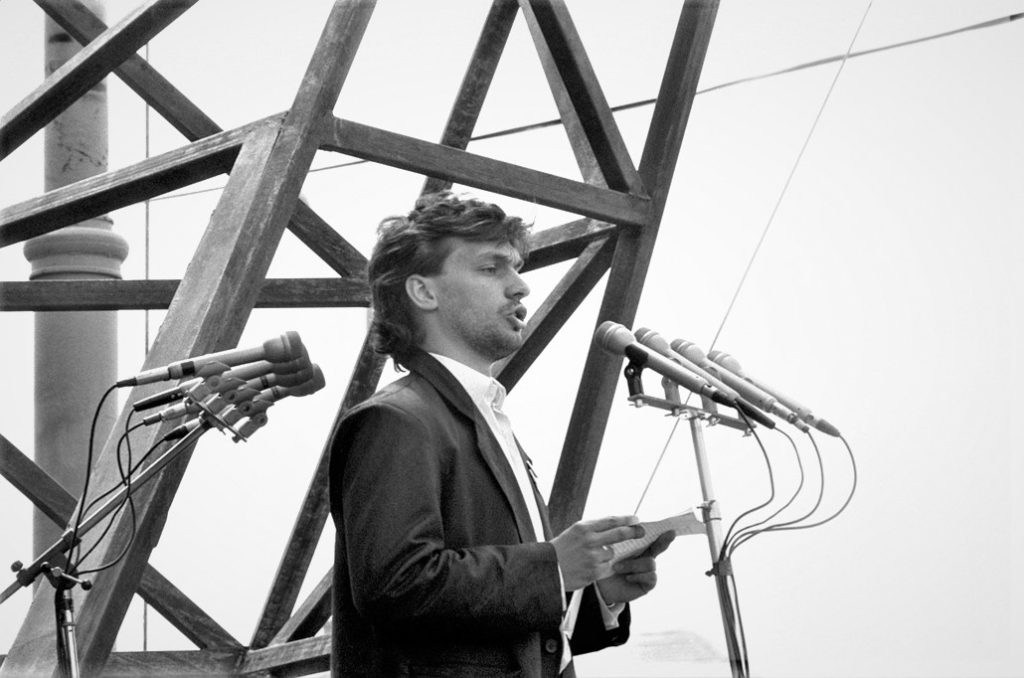BRUSSELS BEHIND THE SCENES
Weekly analysis and untold stories
With SAMUEL STOLTON
Other Brussels behind the scenes stories:
Europe: An unpeopled world, a silent beauty
Brussels is not a city of solitude
In Brussels, a sneeze tells a different story
An EU ‘four-shirter,’ for the wrong reasons
What the hell happened to Viktor Orbán?
It is 1989 and a sprightly 26-year-old Viktor Orbán has arrived at the green lawns and spired horizons of Oxford. He is to take up a scholarship at the University’s Pembroke College, under the subsidy of philanthropist and investor George Soros.
Nearly thirty years later, in the summer of 2017, a series of large billboards appears across Hungary. On them the face of Soros is pasted with the words: “Let’s not Soros have the last laugh.” The posters have been financed by Orbán’s anti-immigration government, in response to Soros’ pro-immigration pressure.
Sent out every Friday afternoon, BRUSSELS BEHIND THE SCENES brings the untold stories about the characters driving the policies affecting our lives. Analysis not found anywhere else, The Brussels Times' Samuel Stolton helps you make sense of what is happening in Brussels.
If you want to receive Brussels behind the scenes straight to your inbox every Friday, subscribe to the newsletter here.
Vicissitudes in the relationship between Orbán and Soros over the past 30 years encapsulate the Hungarian Prime Minister’s transformative political unfolding ever since his country managed to fend off the politburo.
In the late 80s and early 90s, Orbán was heralded as a proponent of democracy in the resistance against the Soviet regime. However, more recently, events this week have caused some to suggest that the erosions of the democratic method in Hungary, under Orbán’s premiership, are at their most severe.
Before embarking on his brief academic sojourn at Oxford, Summer 1989 had proved to be the political making of Orbán.
The previous year, he had mobilized the student community at Budapest’s Eötvös Loránd University to form the Fiatal Demokraták Szövetsége (Alliance of Young Democrats), or as it is more commonly known today: Fidesz.
The alliance was committed to ending the Soviet occupation of Hungary, following the failed revolutionary coup in 1956, which saw erstwhile Prime Minister Imre Nagy executed for announcing the withdrawal of Hungary from the collective Soviet defence treaty, the Warsaw Pact. Orbán, meanwhile, became Fidesz’s very first spokesperson.
Following the Communist Party’s admission that Nagy had been executed illegally in 1956, the former Prime Minister was given a reburial in 1989, in front of tens of thousands of sprawling Hungarians in Budapest’s Hero’s square. Delivering a speech at the ceremony, the stage had been set for Orbán to transform himself into a formidable activist for the extension of democracy in Hungary.
In his memoirs, former Belgian Prime Minister Wilfried Martens recounts that Orbán’s speech, in which he “demanded free elections and the withdrawal of Soviet troops from the country” helped to bring the young arriviste “wide national and political acclaim.”
In turn, this led to Orbán’s personal involvement in the ‘Hungarian Round Table Talks’ of Summer 1989 in which the ruling Communists sat down with opposition parties to broker a deal on the future of Hungary. Orbán with Fidesz, alongside opposition groups, demanded such liberal freedoms including free media and free elections.
A few months later, Orbán found himself embarking on a period of study at Oxford, in which he immersed himself in the history of British liberal political philosophy, at a time in which the political landscape of Hungary and the continent was experiencing a radical upheaval.
BRUSSELS BEHIND THE SCENES POWERED THIS WEEK BY
The Berlin Wall fell in November 1989 and in early 1990, Orbán devolved himself from the moth-bitten world of British academia and returned to Budapest, where soon after he was elected to Parliament in Hungary’s second ever democratic elections.
Orbán became Prime Minister for the first time in 1998, marking the transformation of Fidesz from its beginnings as a dissident student movement into a mainstream European political power.
On Monday, Fidesz once again charted a profound political mutation, after the Parliamentary adoption of new emergency powers that will permit Orbán’s government to rule by decree without a set time limit. Effectively, Orbán has been granted absolute powers to govern over Hungary.
The reaction in Brussels was turbulent. At first reticent to comment directly against Hungary, the Commission eventually ceded to pressure, with President Von der Leyen saying she was particularly concerned with the new measures, while Vice-President for Values and Transparency, Věra Jourová, gestured that Orbán’s new consolidation of power was an attempt to “kill democracy.”
The new bill, which was introduced under the guise of a more robust legal framework to counter the spread of the coronavirus, will also curtail the freedom of the media in Hungary – with terms carrying one to five years of imprisonment threatened against those guilty of spreading false information or “distorted” facts, as the wording of the bill goes.
Speaking to Julie Majerczak, head of the Brussels office of journalism rights group Reporters sans frontiers, she told me that the new rules spell the end for democracy in Hungary.
“Orbán is abusing the pandemic to snatch absolute power in Hungary,” she said. “Media freedom has already been severely battered in Hungary over the years, and these new rules will be used against those who should have the rights in a democratic society to hold Orbán’s regime to account.”
This pursuit for autocracy in Hungary is made all the more tragic when surveying Viktor Orbán’s political metamorphosis since his appearance in front of the thousands of desperate allies of democracy as part of Nagy’s reburial at Hero’s Square in June 1989.
From a one-time resolute proponent of liberal freedoms and democratic virtues emerges a leader with the propensity to cause the most inimical corrosions to European values.
Perhaps Orbán fetishizes over seeing his own geopolitical puppetry dismantle the floorboards of the European political playhouse? Perhaps he is just madly intoxicated with his own brand of relevance and distinctiveness in a world saturated with liberal protagonists, a club of which he was once a part?
In 2017, the response from Soros to the Hungarian government, following its castigations against him as part of the anti-immigration billboard campaign, was acerbic, with Soros’ spokesperson Michael Vachon saying that Orbán’s moves were “reminiscent of Europe’s darkest hours.”
If the Hungarian government’s new measures mark the final juncture in Orbán’s political transformation from a Soviet dissenter to an exponent of political absolutism, then I fear that this week, perhaps a light somewhere else in Europe has been further extinguished.
Sent out every Friday afternoon, BRUSSELS BEHIND THE SCENES brings the untold stories about the characters driving the policies affecting our lives. Analysis not found anywhere else, The Brussels Times' Samuel Stolton helps you make sense of what is happening in Brussels.
If you want to receive Brussels behind the scenes straight to your inbox every Friday, subscribe to the newsletter here.


